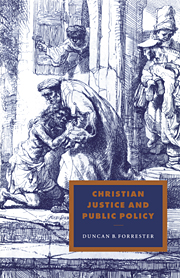Book contents
- Frontmatter
- Contents
- General editors' preface
- Preface
- Introduction
- PART I JUSTICE IN DISPUTE
- PART II POLICIES AND PRACTICES
- PART III THEORIES AND THEOLOGIES
- PART IV THEOLOGICAL FRAGMENTS
- 8 Lively and truthful survivals?
- 9 Love, justice and justification
- 10 Justice and community
- 11 The hope of justice
- Select bibliography
- Subject index
- Name index
- CAMBRIDGE STUDIES IN IDEOLOGY AND RELIGION
11 - The hope of justice
Published online by Cambridge University Press: 02 November 2009
- Frontmatter
- Contents
- General editors' preface
- Preface
- Introduction
- PART I JUSTICE IN DISPUTE
- PART II POLICIES AND PRACTICES
- PART III THEORIES AND THEOLOGIES
- PART IV THEOLOGICAL FRAGMENTS
- 8 Lively and truthful survivals?
- 9 Love, justice and justification
- 10 Justice and community
- 11 The hope of justice
- Select bibliography
- Subject index
- Name index
- CAMBRIDGE STUDIES IN IDEOLOGY AND RELIGION
Summary
We have already encountered the importance of hope at various places and, in particular, in both our case studies. A prison regime that is not hopefully open to the future is destructive and demoralising for prisoners and staff alike. The May Committee sought a future-oriented element in prison regimes, and Professor Bottoms urged that statements of the aims of imprisonment should include ‘some explicit dimension of hope’. We also saw how poor people's lot was worse if deprived of hope, and how frequently a social hope was generated among the poor and the deprived, so that they became bearers of hope. Hope keeps open the horizon of the future and motivates to action; practice is enriched and strengthened if it is hopeful. Alan Paton, in a remarkable article on ‘The Nature and Ground of Christian Hope Today’, declared, ‘I am a man of hope, … to me hope is inseparable from life’. Yet hope hardly featured in the secular theories of justice which we examined; but it is hard to go far into the Judaeo-Christian understanding of justice without acknowledging the centrality of hope.
Hopes are, of course, of many kinds. Some are an escape from reality, pipe-dreams or expressions of alienation. Some are strictly individual and private. Other hopes of a political sort have shown during this century how hope as the search for Utopia can become appalling tyranny. Other hopes have generated great and humane movements for reform and for liberation. Many, but not all, forms of hope are rooted, at least at their birth, in religious ground.
- Type
- Chapter
- Information
- Christian Justice and Public Policy , pp. 246 - 259Publisher: Cambridge University PressPrint publication year: 1997

